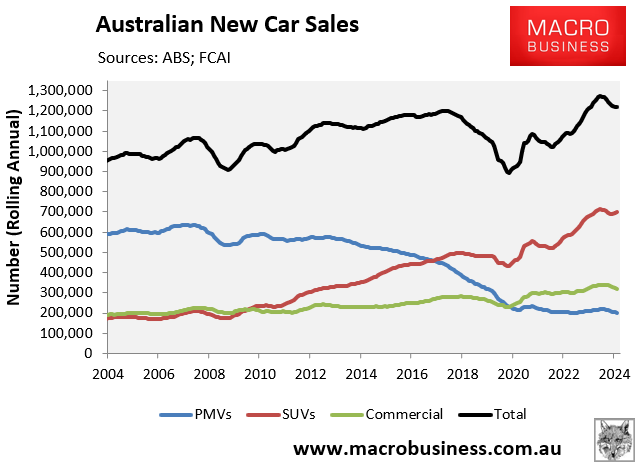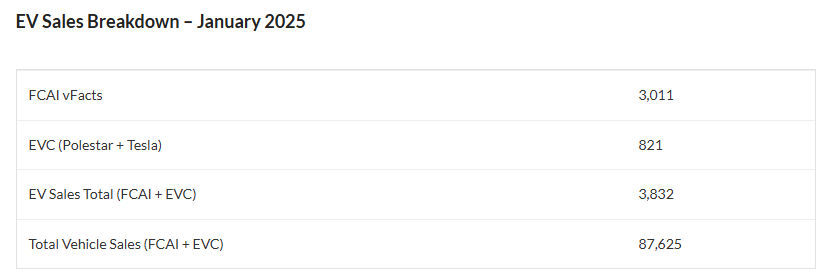According to the Federal Chamber of Automotive Industries (FCAI), only 86,804 new cars were delivered in January 2025, down 3.3% from the same month in 2024.

FCAI Chief Executive Tony Weber noted that “sales of hybrids and plug-in hybrid vehicles continued to grow and now make up nearly one in five new sales, representing 17.1% and 2.2% of sales, respectively”.
“However, sales of battery electric vehicles were remarkably low and based on data from all sources, EVs accounted for just 4.4%, the lowest since October 2022″.
“This is a major concern because consumers are turning away from EVs at the time the Commonwealth Government has introduced the New Vehicle Efficiency Standard (NVES)”, noted Webber.
Electric vehicle news site The Driven lamented that Australian EV sales have crashed.

Only 3,832 battery electric vehicles were sold in Australia in January, representing just 4.4% of total sales.

Source: The Driven
The soft sales are despite generous government subsidies and financial incentives from the federal and state governments.
These subsidies include an increase in the luxury car tax threshold and exempting battery EVs from fringe benefits tax and customs charges.
Battery EVs are also exempt from paying road user charges in the form of the 50.6 cents per litre fuel excise, which is a subsidy.
However, some states in Australia have lowered rebate programs and tax benefits, lowering demand for battery EVs.
It is a similar situation in other nations where demand for battery EVs has stalled following the unwinding of subsidies.
German battery EV sales plunged by more than a third in December whereas French sales contracted by 20% following the withdrawal of government tax breaks.
Only one in 10 private buyers chose a battery EV in the UK in 2024, despite draconian rules punishing OEMs for failing to meet EV sales targets.
Net zero utopia California reported flatlining EV sales in 2024, with only one in four new cars sold being a battery EV. Like the UK, California has threatened heavy fines if OEMs fail to meet EV sales targets.
Battery EV sales collapsed in New Zealand in 2024 after the Clear Car Discount subsidy ended on December 31, 2023.
Battery EV sales also fell in France, led by a massive decline in Tesla sales.
Meanwhile, the latest Carsales EV Consumer Survey report revealed that only 18% of respondents believe they will be driving a battery EV by 2030; a sharp decline from 40% in a June 2022 survey.
The loyalty of current EV owners has also declined. While 83% of battery EV owners are likely to buy another EV in the future, this represented a decline from 95% in May 2023.
As usual, the Electric Vehicle Council lobby group demanded more taxpayer subsidies.
“Governments should come back to the table and consider reintroducing and expanding reasonable purchase incentives to drive EV adoption to a critical mass, including support to purchase second-hand EVs”, Electric Vehicle Council Head of Legal, Policy and Advocacy Aman Gaur said.
There’s nothing like other people’s money.
Several major global automobile manufacturers have wound back battery EV production due to sluggish consumer demand and soft sales.
The reality is that battery EVs are not ready for mass deployment. They remain prohibitively expensive, lack quick and convenient charging options, have a short range (particularly on highways without regenerative braking or when heavy heating or air conditioning is required), incur high insurance and repair costs, and depreciate dramatically.
Standard hybrids, on the other hand, address most of these drawbacks, explaining why their sales have soared.
Toyota has produced reliable and reasonably priced hybrid cars since the late 1990s, when it introduced the Prius.
Hybrid vehicles provide excellent fuel economy and range, are convenient, and have a higher resale value.
In contrast, battery EVs are inconvenient if you lack off-street parking or engage in long road trips. They also depreciate in a similar way to consumer electronics.

